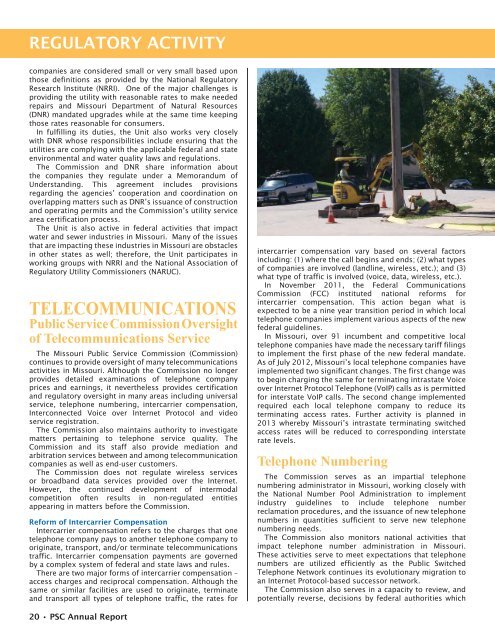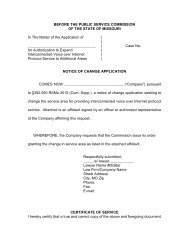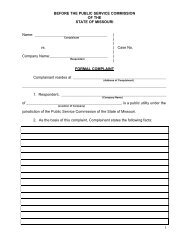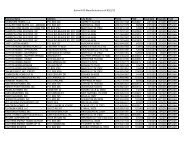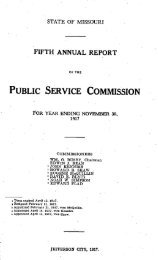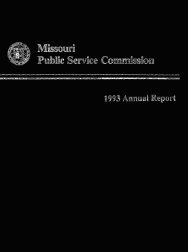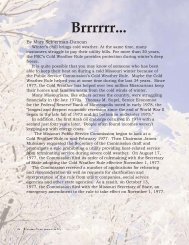REGULATORY ACTIVITYfiling, the <strong>Commission</strong> brought to FERC’s attention two gasloss incidents which, per <strong>Commission</strong> precedent, shouldnot be included in the calculation of the LUFG percentage.FERC agreed with the <strong>Commission</strong> and required CEGT toremove the two losses in question and recalculate the fuelloss reimbursement percentage to be charged to <strong>Missouri</strong>consumers.The <strong>Commission</strong> will continue to analyze the pipelinecompanies fuel recovery cases to determine whether therates to be charged <strong>Missouri</strong> consumers are just andreasonable.Atmos Energy Corporation/Liberty Energy Midstates Corp.Atmos Energy sold its <strong>Missouri</strong> assets to Liberty EnergyMidstates. Atmos filed at FERC to transfer its <strong>Missouri</strong>natural gas transmission and distribution facilities to LibertyEnergy. The <strong>Commission</strong>’s concern regarded facilitieslocated in western <strong>Missouri</strong> which contained a 35-foot stubline that crosses the Kansas/<strong>Missouri</strong> border. After thesale, this stub line will be controlled by Atmos’ Colorado/Kansas division, not Liberty Midstates.The <strong>Commission</strong> intervened at FERC over concerns asto whether <strong>Missouri</strong> customers would continue to receivethe same level of service after the sale to Liberty Energywas final. The Kansas Corporation <strong>Commission</strong> (KCC) alsofiled comments in the case. The <strong>Commission</strong> was able tonegotiate with Atmos and Liberty Energy to assure reliableservice to <strong>Missouri</strong> customers.MoGas Pipeline LLCAt the end of June 2006, FERC regulated <strong>Missouri</strong>Interstate Gas LLC (MIG), and <strong>Missouri</strong>-regulated <strong>Missouri</strong>Pipeline Company LLC (MPC) and <strong>Missouri</strong> Gas CompanyLLC (MGC) applied to FERC for authority to merge into asingle FERC-regulated interstate pipeline. On April 20,2007, FERC issued an order authorizing the three affiliatedpipelines to merge as MoGas Pipeline (MoGas). The FERCorder also reduced MoGas proposed rates by approximately$2 million as a result of the <strong>Commission</strong>’s (and otherparties) challenge to the rates.In the same proceedings, the <strong>Commission</strong> challengedFERC’s order that permitted MoGas to include an acquisitionpremium in rates that resulted in an annual overcharge to<strong>Missouri</strong> customers of approximately $1.3 million annually.FERC denied the <strong>Commission</strong>’s challenge. The <strong>Commission</strong>appealed FERC’s decision to the United States Court ofAppeals for the D.C. Circuit Docket No. 9-2 andon April 13, 2010, the DC Circuit Court agreed with the<strong>Commission</strong>’s arguments and vacated the FERC’s order andremanded the case to FERC.On August 1, 2011 the FERC held a hearing to addressthe acquisition premium issue. The initial decision by theAdministrative Law Judge in this case, issued in November2011, supported the <strong>Commission</strong>’s position. The finalFERC order in this case is still pending.CenterPoint Energy-Mississippi River TransmissionIn October 2011, Mississippi River Transmission (MRT)provided notice to the public that it intended to meet withcustomers and state commissions prior to filing a FERC casefor a rate increase. The <strong>Commission</strong> participated in prefilingsettlement discussions with CenterPoint Energy-MississippiRiver Transmission (MRT) during the summer of <strong>2012</strong>.During June and July, customers, the <strong>Commission</strong> and otherinterested parties negotiated with MRT. These negotiationsfailed to reach a settlement among the parties. On August15, <strong>2012</strong>, MRT filed a Section 4 rate case with FERC asking fora rate increase of approximately 80% to recover nearly $104million from customers through rates annually. MRT servesthe St. Louis area natural gas market. Both the Arkansas <strong>Public</strong><strong>Service</strong> <strong>Commission</strong> and the Illinois Commerce <strong>Commission</strong>have intervened in the Section 4 rate case.WATER AND SEWERUNITRate Cases Decided or Filed<strong>Missouri</strong>-American Water CompanyCase No. WR-2-33On June 30, 2011, <strong>Missouri</strong>-American Water Company(MAWC) filed a water and sewer rate case with the <strong>Public</strong><strong>Service</strong> <strong>Commission</strong> (<strong>Commission</strong>) seeking to increaseannual water and sewer revenues by approximately $43million. The <strong>Commission</strong> granted MAWC an overall rateincrease of approximately $24 million in an order issued onMarch 7, <strong>2012</strong>, based upon a non-unanimous stipulationand agreement filed by the parties to the proceeding.Although the agreement was non-unanimous, no partyopposed the agreement that settled all issues in the case.The increase to water revenues approved was $23,275,000and the increase to sewer revenues approved was $725,000on an annual basis. Rates went into effect on April 1, <strong>2012</strong>.For MAWC customers in the former Aqua <strong>Missouri</strong> serviceareas, rates went into effect on June 1, <strong>2012</strong>.Water and Sewer Unit StaffThe Water and Sewer Unit (Unit) provides technical expertisein the operation of the water and sewer companies in <strong>Missouri</strong>and analyzes applicable tariffs and tariff filings to ensure theyare in compliance with appropriate state law, <strong>Commission</strong>rule, and are fair for both the utility and consumer.The main functions of the Unit are to assist small companiesin their day-to-day operations, conduct inspections, assistcustomers, investigate customer complaints, work on tarifffilings, review small and large company rate requests, andreview applications for certificates of public convenienceand necessity to ensure that a proposed utility is in thepublic interest.The Unit plays a key role in developing appropriate ratesrequired for the utility to collect the revenues that havebeen approved by the <strong>Commission</strong>.Another major role fulfilled by the Unit is investigatingcustomer complaints regarding quality of service issues.Unit personnel spend many hours in the field investigatingcomplaints and working with the customer and the companyto find solutions to the customer’s concerns.There are approximately 75 regulated water and/orsewer companies in the State of <strong>Missouri</strong>. Most of these<strong>PSC</strong> <strong>Annual</strong> <strong>Report</strong> 9
REGULATORY ACTIVITYcompanies are considered small or very small based uponthose definitions as provided by the National RegulatoryResearch Institute (NRRI). One of the major challenges isproviding the utility with reasonable rates to make neededrepairs and <strong>Missouri</strong> Department of Natural Resources(DNR) mandated upgrades while at the same time keepingthose rates reasonable for consumers.In fulfilling its duties, the Unit also works very closelywith DNR whose responsibilities include ensuring that theutilities are complying with the applicable federal and stateenvironmental and water quality laws and regulations.The <strong>Commission</strong> and DNR share information aboutthe companies they regulate under a Memorandum ofUnderstanding. This agreement includes provisionsregarding the agencies’ cooperation and coordination onoverlapping matters such as DNR’s issuance of constructionand operating permits and the <strong>Commission</strong>’s utility servicearea certification process.The Unit is also active in federal activities that impactwater and sewer industries in <strong>Missouri</strong>. Many of the issuesthat are impacting these industries in <strong>Missouri</strong> are obstaclesin other states as well; therefore, the Unit participates inworking groups with NRRI and the National Association ofRegulatory Utility <strong>Commission</strong>ers (NARUC).TELECOMMUNICATIONS<strong>Public</strong> <strong>Service</strong> <strong>Commission</strong> Oversightof Telecommunications <strong>Service</strong>The <strong>Missouri</strong> <strong>Public</strong> <strong>Service</strong> <strong>Commission</strong> (<strong>Commission</strong>)continues to provide oversight of many telecommunicationsactivities in <strong>Missouri</strong>. Although the <strong>Commission</strong> no longerprovides detailed examinations of telephone companyprices and earnings, it nevertheless provides certificationand regulatory oversight in many areas including universalservice, telephone numbering, intercarrier compensation,Interconnected Voice over Internet Protocol and videoservice registration.The <strong>Commission</strong> also maintains authority to investigatematters pertaining to telephone service quality. The<strong>Commission</strong> and its staff also provide mediation andarbitration services between and among telecommunicationcompanies as well as end-user customers.The <strong>Commission</strong> does not regulate wireless servicesor broadband data services provided over the Internet.However, the continued development of intermodalcompetition often results in non-regulated entitiesappearing in matters before the <strong>Commission</strong>.Reform of Intercarrier CompensationIntercarrier compensation refers to the charges that onetelephone company pays to another telephone company tooriginate, transport, and/or terminate telecommunicationstraffic. Intercarrier compensation payments are governedby a complex system of federal and state laws and rules.There are two major forms of intercarrier compensation –access charges and reciprocal compensation. Although thesame or similar facilities are used to originate, terminateand transport all types of telephone traffic, the rates forintercarrier compensation vary based on several factorsincluding: (1) where the call begins and ends; (2) what typesof companies are involved (landline, wireless, etc.); and (3)what type of traffic is involved (voice, data, wireless, etc.).In November 2011, the Federal Communications<strong>Commission</strong> (FCC) instituted national reforms forintercarrier compensation. This action began what isexpected to be a nine year transition period in which localtelephone companies implement various aspects of the newfederal guidelines.In <strong>Missouri</strong>, over 91 incumbent and competitive localtelephone companies have made the necessary tariff filingsto implement the first phase of the new federal mandate.As of July <strong>2012</strong>, <strong>Missouri</strong>’s local telephone companies haveimplemented two significant changes. The first change wasto begin charging the same for terminating intrastate Voiceover Internet Protocol Telephone (VoIP) calls as is permittedfor interstate VoIP calls. The second change implementedrequired each local telephone company to reduce itsterminating access rates. Further activity is planned in2013 whereby <strong>Missouri</strong>’s intrastate terminating switchedaccess rates will be reduced to corresponding interstaterate levels.Telephone NumberingThe <strong>Commission</strong> serves as an impartial telephonenumbering administrator in <strong>Missouri</strong>, working closely withthe National Number Pool Administration to implementindustry guidelines to include telephone numberreclamation procedures, and the issuance of new telephonenumbers in quantities sufficient to serve new telephonenumbering needs.The <strong>Commission</strong> also monitors national activities thatimpact telephone number administration in <strong>Missouri</strong>.These activities serve to meet expectations that telephonenumbers are utilized efficiently as the <strong>Public</strong> SwitchedTelephone Network continues its evolutionary migration toan Internet Protocol-based successor network.The <strong>Commission</strong> also serves in a capacity to review, andpotentially reverse, decisions by federal authorities which2 <strong>PSC</strong> <strong>Annual</strong> <strong>Report</strong>


